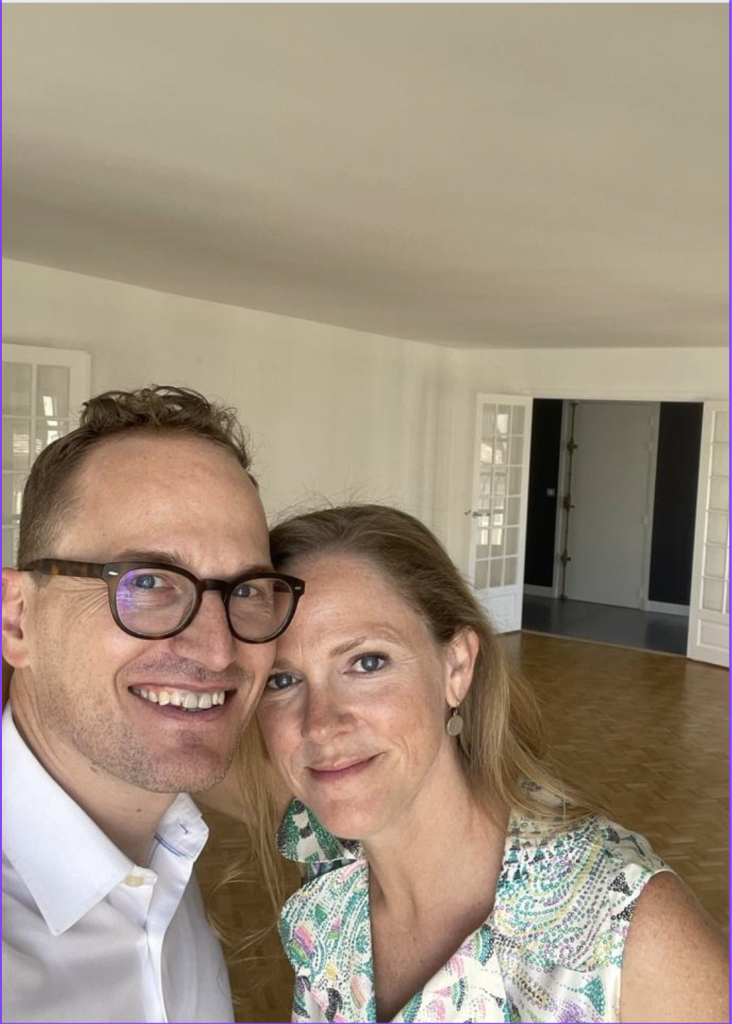
SUCCESS STORY n°1 : Lisa & Jeremy
Welcome to this new article format, in which we’ll be interviewing our relocated customers, so that they can tell us their stories, the reasons why they decided to move to France, their fears/stress about it, and of course, how they feel about their experience with us!
Today, Lisa and Jeremy, an American couple who moved to France this year with our help, will do us the honor of inaugurating this format!

To begin with, can you tell us how you ended up in Paris? What brought you to this beautiful city? As an American, how did you get up and move here? :
Starting around 2017, we started getting pretty uncomfortable with the values system of America, and it wasn’t just Trump. We love the U.S., we are full-blooded Americans, we will always be American in our hearts, and there is an endless list of things we love about the place and all that it has instilled in us—but/and—things like lack of universal healthcare, work-hustle obsessiveness, social media culture, inherent ‘source code’ problems with racism and oppression, the non-representative nature of the electoral college and political system, and a more or less absent response to climate change (and one very smoky, dystopian ‘orange day’ in San Francisco in September 2020)… these were all contributing factors.
But it was probably gun violence, especially in schools—and that ambient fear—that was the final straw. One can learn to live with a lot of things—one can volunteer, march in the streets, select certain places to live, choose the right projects, and lean in through personal day-to-day behaviors to resolve a lot of values misalignment; but in the end we realized that much (all?) of what we were resisting boiled down to a lack of respect for humanity, dignity, and life. There came a point, after Jeremy found himself in Vegas the night 59 people died on the strip at a music festival (including a woman from the company where I was then working), that we realized we had to go, if we could.
We realized that until the second amendment changed, we just weren’t going to find comfort living in America within our lifetimes. Not to be a debbie-downer, but in many ways it was death by a thousand cuts. My sister had been living in the U.K. for over a decade, so we had a template of sorts. Then a friend told us about the golden visa in Portugal, and even though golden-visa real estate deals were not our ultimate pathway into Europe, it was the opening we needed to see and understand that there was a way into a better life and lifestyle.
COVID-19 was probably the last crumbling pretense, as it proved that our work could be done from anywhere, and it also proved that you only need your family and a small pod of a few good friends to survive—and maybe even thrive. France was always our preference, so we researched options and found the Passeport Talent for business creators, which prompted moving my then 7-year independent design consulting business from the U.S. to France, capitalizing it, and promising to create jobs. We viewed it as a reasonable trade for the lifestyle we wanted for ourselves and our kids. Plus, I can call my sister now anytime I want, no timezone calendaring required. 🙂
Now, let’s dive into the house hunting journey! How did you go about looking for a home, and what factors influenced your decision-making process?
Through the Passeport Talent visa scheme, I met several people at Business France, the group within the Ministry of the Economy & Finance that more or less oversees the Passeport Talent immigration program. The folks at Business France gave me a few select recommendations on people and service providers in France whom they trusted to help new arrivals like us settle in our adopted country. I made contact with MR Real Estate early, before we had even departed the U.S. Then, once we were in France and renting a furnished apartment for our first year, I stayed in touch with Melissa. After about five months post-arrival, I started casually browsing properties via the Figaro app, mostly out of curiosity at that point, but I fell in love with one place in particular, so at that point, I called Melissa. From there, she shepherded us through the very different home-buying process.
The main thing that influenced me to “go for it” at that time was that I knew I wanted a home that was “hyper-centre” in my little town, more or less above the train station, or at least within steps of it, mixed in with retail and life and vibrancy. And I also wanted a home that was big enough for my family of four that needed absolutely zero remodeling—totally modern and fully updated. That felt like a pipe dream, until magically a place exactly like that popped up. I knew this was exceedingly rare, so I decided to call Melissa and POUNCE. She helped us be successful in that endeavor, and we moved in less than six months after the day I first saw it with the seller’s agent. This is kind of incredible considering the French process and our newness in the country.
Since you’ve experienced becoming a homeowner in both France and US, what differences did you discover between the two processes? Anything that stood out or caught you by surprise?
First and foremost, we did not want to be all-cash buyers. French interest rates are subsidized, even for new-arrival foreigners, so we had access to a 3.4% loan fixed-rate over 25 years, at a time when similar loans in the states were priced at around 7%. The problem is that to get a French mortgage, at least one person in the marriage needed to have a salaried position (“CDI”) with a French firm. Luckily, thanks to the Passeport Talent visa scheme that we entered on, all working-age members of the family have the right to work, which means my husband obtained a CDI employment contract almost immediately after we arrived.
Since he had that salaried position, banks were at least somewhat willing to talk to us. Without at least one of us having a salaried position, we would’ve been forced to fully cash-finance. However, it still wasn’t easy. Melissa introduced us to a mortgage broker named Martin Heathcoate with France Home Finance who was instrumental in introducing us to six banks and guiding us through the mortgage application process with those institutions. In the end, only one bank offered us a loan: Credit Mutuel. Because this bank is structured similar to a U.S. credit union, the balance sheet and loan-writing capabilities are held locally at each branch, not at some headquarters office with people I’ve never met.
That meant that the bankers involved in my application were in fact the final decision-makers, which enabled Martin and me to make the case to their branch that we were ideal borrowers. It really was fortuitous because now we have a direct banking relationship with the same person who originated our loan, Mr. Yann Jardin, and he’s been a delight to work with. Meanwhile, we had the issue of still needing to cash-finance a portion of the transaction, so Mr. Heathcoate introduced us to a trusted currency exchange consultant who helped us move a hefty sum from the States to France in time for closing—yet another valuable relationship that ultimately traces back to Melissa. Other things that I’ll never forget are markedly different from the U.S. process: mortgage insurance is common. It is priced separately from the loan, and the pricing is based on the physical health of the borrower! So I found myself in a blood draw center one Tuesday morning on the east side of Paris proving that I have no serious ailments. To price financial products (or any products!) based on personal health would be unheard of in the States. We learned that people over a certain age are simply ineligible for mortgage loans in France, for these reasons—the lending bank does not want to lend to someone who might not be around for 25 years to make every payment, and the mortgage insurers are equally loath to insure that person.
Again, product non-availability / pricing differences based on age would be unheard of in the States. We of course realize that it’s because French banks keep the loans on their balance sheets rather than offloading them immediately to quasi-governmental entities like Freddie Mac or Fannie Mae, so it makes macro-economic sense why the banks would be so much tighter with credit, but it’s still alarming to experience as an individual. We also figured out how the interest rates are kept so low: the transaction tax payable to the government at the time of sale. We presume this hefty tax is what subsidizes the mortgage rate for everyone nationwide. Incidentally, the payment of this tax to the government is handled by the buyer’s notaires, who are licensed real estate attorneys who act as the primary representative for the buyer in real estate transactions, drawing up the bespoke documents and conferring with their notaire counterparts on the seller’s side.
Both sides of the transaction have these notaire attorneys, but only the seller’s side tends to have what we in the States think of as a “real estate agent.” The fact that Melissa served as our “buyer’s agent” (and introduced us to our notaires, another great connection!) is relatively unusual, but 100% necessary from our point-of-view, being new arrivals with limited understanding of both the transaction process and the language.
We love a good surprise! What was the most unexpected or delightful thing you encountered during the journey into your French dream home?
Property taxes are basically nil compared to the States! We were also so amused by the date of construction on the title deed: it literally says “17th century” and that’s it.
Lastly, what do you love most about living in Paris?
The people. I know everybody says something like the opposite, but how can you not love this group of humans who have really figured out how to live? The lifestyle of France only exists because of the French. I’m grateful for all that they’ve created and protected. We are enchanted anew every day.
And that’s what we’ll conclude this interview with. We hope you found it interesting, and we invite you to take a look at our other articles!

